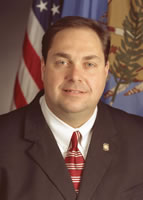In order to provide equal access and equal opportunity to people with diverse abilities, this site has been designed with accessibility in mind. Click here to view
Choctaw Nation Lauded by Senate for Support of National Guard and Reserve
 Sen. Jay Paul Gumm
Sen. Jay Paul Gumm
The Choctaw Nation was honored by the Oklahoma State Senate Thursday for its outstanding support of the National Guard and Reserve as well as veterans. Sen. Jay Paul Gumm, a Democrat from Durant, was author of Senate Resolution 48, praising the tribe which was the recipient of the 2008 Pro Patria Award—the highest honor bestowed for support of military men and women. The Choctaw Nation was also awarded the 2008 Secretary of Defense Employer Support Freedom Award.
“Oklahomans who serve our country do so at tremendous personal expense and risk. The Choctaw Nation has gone above and beyond to support those men and women,” Gumm said. “They are a shining example of how employers and communities can go that extra mile for our military personnel.”
The Choctaw Nation provides pay differential, 30 days paid military leave per year, insurance, care packages and phone cards as well as equipment, including special knives and walkie-talkies which were sent to the 95th Reservists so that transport teams could communicate during low visibility.
“The Choctaw Nation has long supported the defense of our nation, with citizens fighting for America in World War I who became the original code talkers—and this was at a time when they did not even have full citizenship rights within the United States,” Gumm said.
The Choctaw Tribal Council also funds a Veterans Advocacy Program, an annual Veterans Ceremony, and has provided property and funding for a Veterans Cemetery. The tribe also purchased an ultrasound machine for detecting embedded shrapnel in wounded soldiers, and has provided emergency assistance for families while military members are deployed.
Chief Gregory E. Pyle said it was an honor to appear before the Senate, and noted the Choctaw nation supported both Choctaw and non-Choctaw troops and alike.
“You can’t ask any more from the veterans,” Pyle said. “They leave their families, their wives and their children and sometime they don’t return home, so you can’t do too much for them.”
 Oklahoma Senate
Oklahoma Senate

